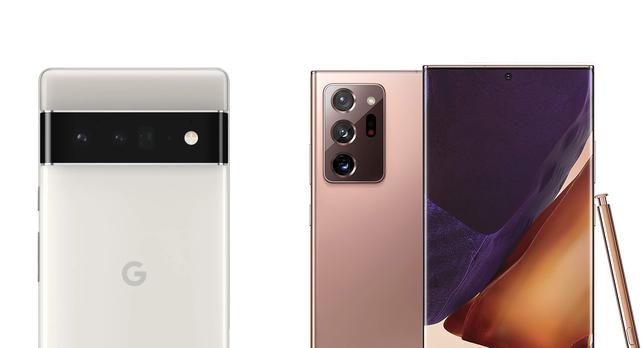I’ve been covering Google and the Pixel series for a long time. While most people get caught in the trees and love to compare the Pixel against the other smartphones on performance and specs, one of my favorite past times is trying to zoom out, look at the forest, and create a narrative around what Google is trying do — or try to decipher what they
think
they’re trying to do. Here’s my attempt at this given today’s
Pixel 6 pre-announcement
.
I see the Pixel 6 as the beginning of new phase for the Pixel lineup. Let’s call phase 1: “maybe we can make a phone that will appeal to both Samsung and Apple users, and break the duopoly with a third tentpole flagship phone that is distinctly
“. Phase 2, to me, seems more like: “screwit, Pixel is an Android phone, we can’t break into Apple’s stronghold,
so down with Samsung
.”
There are a few things that tip me off on this change. The first is… well, just look at this thing. Google has made some really well-designed phones in my view (I still love the
Not Pink
Pixel 3), but nothing like this. This phone is a Samsung phone with the G logo on the back and a funky camera bump to give it a signature spice. It’s clearly aimed at the very same demographic that buys the flashy $1,000 Samsung phone every year.
The second thing is that Google
isn’t playing around on the hardware specs here
. Much like Apple has done with the iPhone over the years, the Pixel series up to this point has often made lots of compromises on specs in the name of pursuing some design principle or user experience. The thing that comes to mind is the decision to go without a fingerprint sensor on the Pixel 4. Mirrorring the iPhone X series, Pixel 4 was the only Android phone to go with just face unlock (paired with Soli) under the idealistic principle that fingerprint was redundant and people just needed to get used to face-based security. The endgame for smartphone security is TBD, but it’s clear this decision — and others like it over the years — did very little to sway iPhone users away from the Apple ecosystem into the land of Ivy Ross’ comfy fabric simplicity, and a few Googley feature differentiators did very little to sway Samsung people away from the specs-heavy beastphones they’re used to.
Finally, Google is being

upfront about the fact they’re going to market the hell out of this thing
. But do they really think they will be able to convince longtime Apple walled garden members to exit the ecosystem because they’ve made a nicer Samsung phone with definitely-way-better software design and some Googley things?
No
. Of course they’ll get some people here and there (and they’re
preparing for that
!), but there’s no way in my view that they’re going to get any more switchers than Samsung manages to get every year, which is not many. In fact, I think this change of tone is directly reflective of that admission. No, in the Samsung/Apple duopoly, I think the Pixel 6 and Pixel 6 Pro are aiming straight at Samsung’s half.
And that’s an interesting thing, and a very significant change of tone. There has been a lot of give and take with Google and Samsung’s relationship forever, but especially in recent years. Google was intimately involved in helping Samsung with foldables. Google is handing over Wear OS to Samsung for upcoming Galaxy Watches. On the other hand, Samsung phones running Android is really the only reason Android has as much market share against iOS as it does (in the US). Perhaps the most ironic and interesting dynamic unique to this phone is that, while it’s clearly targeted at Samsung, it’s running an SoC that was
codeveloped by Samsung
.
Google launching the Pixel in the first place was an interesting dynamic since Samsung’s hardware prowess has always been critical to Android’s existence. Up to this point, Google seemed to keep “targeting flagship Samsung phones directly” out of the cards. But alas, “Samsung people” and “Apple people” seem like an unbreakable dichotomy in the market. For five years, Google tried to make a phone that was palatable to the sensitivities of both. It didn’t really appeal to either — or get them much of anywhere.
So, all targets locked on Samsung? Now, it looks like it’s not only in the cards, it
is
the cards — on a year that
Samsung isn’t even launching a Note
, to boot.
FTC: We use income earning auto affiliate links.
More.
Check out 9to5Google on YouTube for more news:









